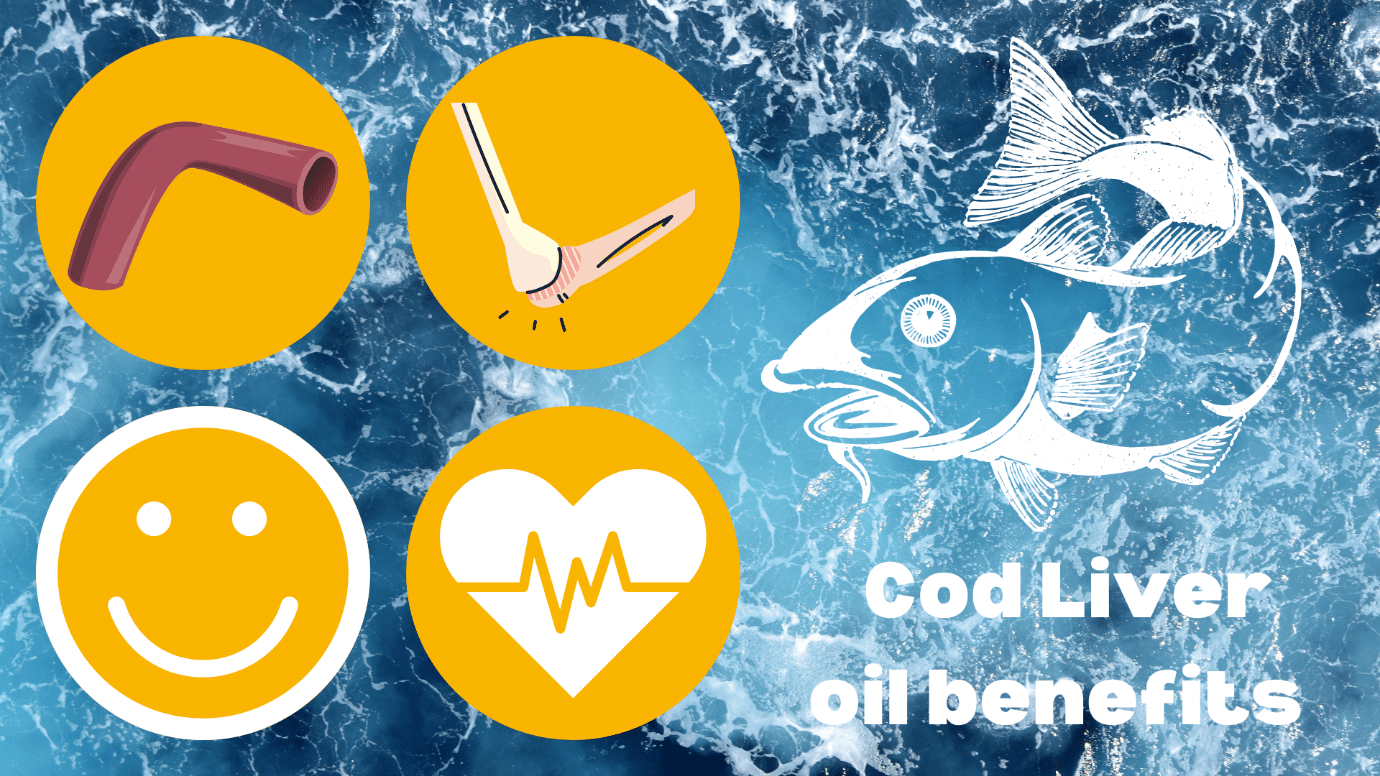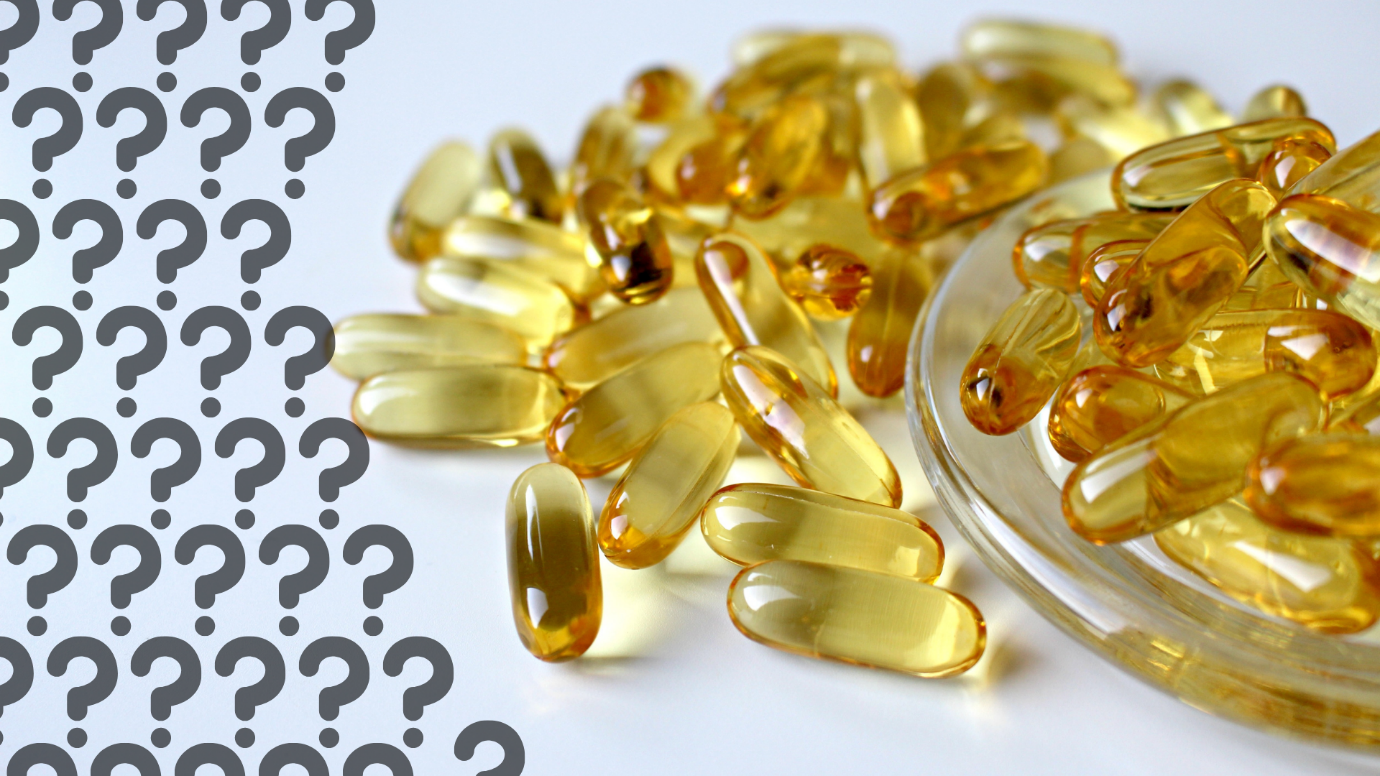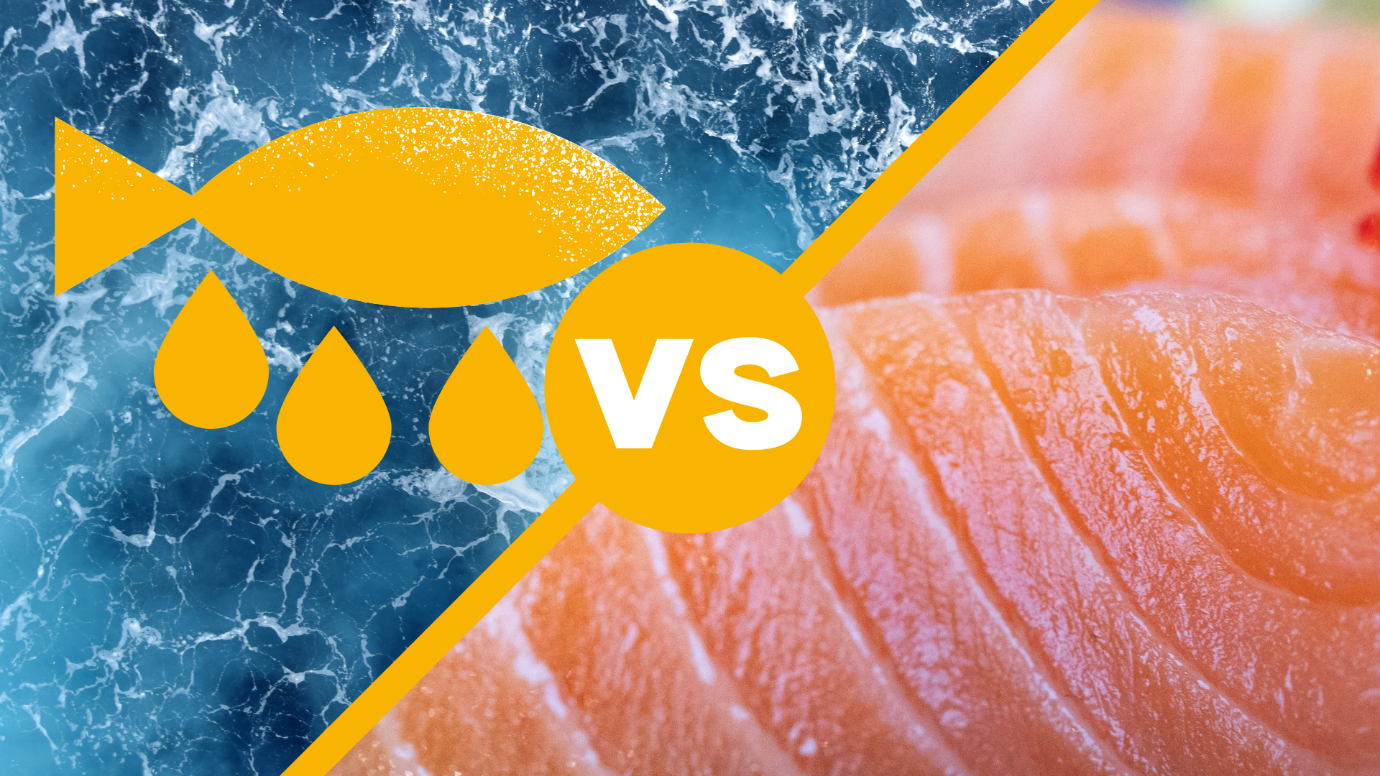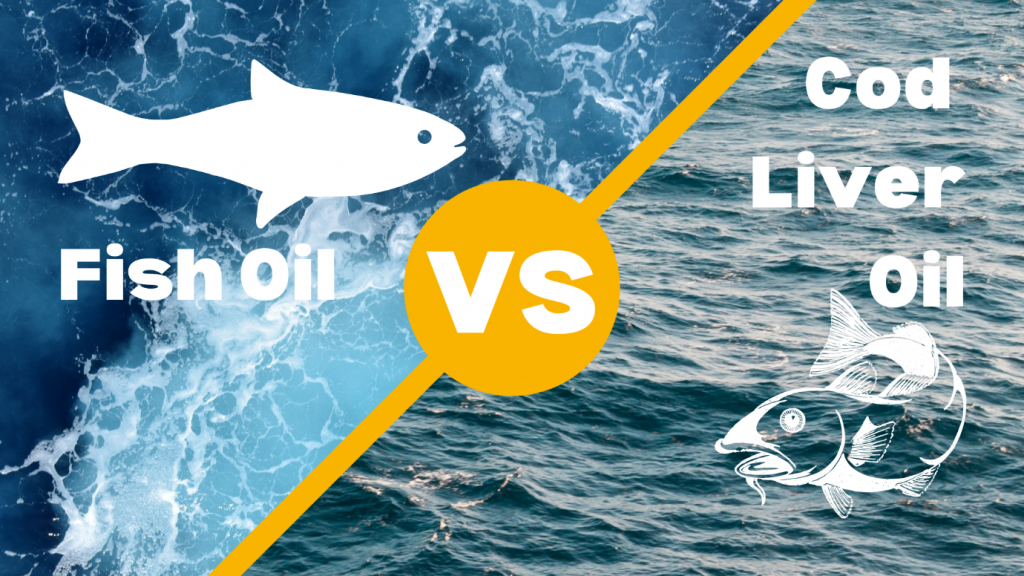Fish oil and Cod Liver Oil are extremely common supplements promoted by everyone from well-meaning parents to bodybuilders, but aren’t they basically the same thing?
Although many people use the terms Cod Liver Oil and Fish Oil interchangeably, there are multiple differences between them, and you could be missing out on lots of health benefits.
To help you make the most out of these fishy supplements, we’ll be diving into cod liver oil vs fish oil, the benefits of each and which is best for your needs.
In much the same way that all thumbs are fingers but not all fingers are thumbs, Cod Liver Oil is Fish Oil, but Fish Oil is not necessarily Cod Liver Oil. While fish oil can be made from a wide variety of oily fish – such as mackerel, salmon, and anchovies – cod liver oil can only be made from (you guessed it) cod livers.
Both fish oil and cod liver oil are rich in omega-3 fatty acids which provide a variety of health benefits, though their concentrations can vary depending on the manufacturing methods used. When discussing which is better in the battle of cod liver oil vs fish oil, there are many factors to consider, like the omega-3 content, levels of other vitamins (if any) and availability, so let’s get right into it.
Table of Contents
Cod Liver Oil vs Fish Oil: Which Is Better?

In short, which is better for you depends on your health goals and the levels of vitamins and minerals you eat on a regular basis. While both options provide a variety of health benefits and are considered safe to consume in medicinal quantities, there are a number of subtle differences in their:
Nutritional Benefits
- Cod liver oil is high in Vitamins A and D which help to maintain eye and bone
- Contrastingly, fish oil contains almost no vitamin A or D after it is processed.
- Both cod liver oil and fish oil are high in EPA and DHA, two forms of omega-3 fatty acids.
Food Sources
- As the name implies, cod liver oil is derived exclusively from the livers of cod.
- Fish oil, however, can be derived from various fish, which may have higher or lower Omega-3 levels.
- When comparing cod liver oil vs fish oil, the cod is more consistent.
What Is Cod Liver Oil Good For?

Cod liver oil was first used to treat rheumatism in the late 1700s and rickets in the early 1800, though these diseases are much rarer now. While it is rarely used to treat these diseases, cod liver oil still offers a wide variety of health benefits, thanks to its high levels of omega-3s, vitamin A and vitamin D.
Benefits of Cod Liver Oil
The unique strengths of cod liver oil vs fish oil are probably due to the presence of vitamins A and D, as well as the omega-3 content. Research also points to the powerful anti-inflammatory effects of cod liver oil as a contributing factor to its many benefits which may help:
- Reduce inflammation
- Lower pain associated with arthritis
- Reduce anxiety and depression
- Maintain bone density
- Lower blood pressure
- Prevent plaque build-up in your arteries
How Much Cod Liver Oil Should I Take?

Because cod liver oil has so many health benefits to offer, you may be eager to include this fishy elixir in your daily routine, but how much cod liver oil should you take to enjoy these benefits? To get the most accurate answer to this question, let’s focus on the active ingredients of cod liver oil – Omega-3 fatty acids, vitamins A and D – and official guidance on effective levels of those compounds:
- The National Institutes of Health recommend you eat between 0.5 and 1.6g of Omega-3 fatty acids a day, though large doses of up to 15g/day are considered safe in the short-term.
- The USDA recommends that men, women, and children take 900, 700 and 300-600mcg of Vitamin A per day, respectively.
- The Recommended Dietary Allowance for Vitamin D is 10mcg a day for infants, 15mcg for children and adults and 20mcg for older adults.
In the battle of cod liver oil vs fish oil, there is an obvious winner if you prize your vitamin A and D, though that is far from the be all and end all of these supplements. Although the nutritional content of cod liver oil varies greatly between different manufacturers, the median average contents are as follows:
| Category | Omega-3 | Vitamin A | Vitamin D |
| Male RDA | 1.6g | 900mcg | 15mcg |
| Female RDA | 1.1g | 700mcg | 15mcg |
| Avg Cod Liver Oil (per 100g) | 20g | 16,6690mcg | 250mcg |
As you can see, cod liver oil is just teeming with nutrients, though 100g is much more than the average person needs (or wants) to take in a day, so 1-2 teaspoon’s worth is plenty to meet your RDAs.
Is Omega 3 The Same as Fish Oil?

At the risk of repeating myself, fish oil and omega 3 are like fingers and thumbs – while fish oil tends to be rich in omega-3 fatty acids, these acids are not fish oil. To use another example, think of omega-3 as a protein: In much the same way that you can find protein in meat, dairy, and beans, you can find omega 3 in fish, certain nuts, and flaxseed.
Similarly, while cod liver oil is a type of fish oil, they come from different sources, have different nutritional content, and provide different health benefits, all key differences in cod liver oil vs fish oil.
The Difference Between Fish Oil and Omega 3
Omega-3 fatty acids are the main active ingredients in fish oil, and while they often make up a large part of fish oil by volume, they are distinct from fish oil and can be found in other foods. Just like protein in meat, gluten in bread or calcium in dairy, omega-3s might be a large part of fish oil, but they are NOT the entirety of it.
Krill Oil Vs Cod Liver Oil

Krill oil is made from tiny crustacean creatures known as krill, as opposed to other, more widely known forms of fish like cod, salmon, etc. While these tiny creatures are more commonly used as bait or eaten by whales, they contain high levels of Docosahexaenoic Acid (DHA) and Eicosapentaenoic Acid (EPA) fatty acids, which are forms of Omega-3s.
When comparing krill oil vs cod liver oil vs fish oil, it’s important to note that most of the omega-3s in krill oil are in the form of phospholipids, a phosphate group with improved bioavailability. Krill oil also contains astaxanthin, a potent natural antioxidant that lends it a reddish colour, so let’s break down the pros and cons now:
Benefits of Krill Oil
- Greater bioavailability, meaning your body can use more of it.
- Krill usually contains less toxins (such as mercury) than other fish.
- Its antioxidant contents (in the form astaxanthin provide various health benefits.
- Has the same benefits of fish oils, thanks to its omega-3 contents.
Costs of Krill Oil
- Has lower omega-3 levels than fish or cod liver oil.
- Can increase your risk of bleeding and impact blood sugar levels.
Does Cod Have Omega 3?

Cod is a common food fish with flaky, white flesh and subtle flavour enjoyed in diverse cuisines the world over, from Jamaican salt cod to Thai fish cakes. Although it is high in protein, B vitamins and minerals and contributes to a healthy diet, cod is rarely promoted as a health food, let alone recommended in the same sentence as its derivative – cod liver oil.
With everyone arguing over cod liver oil vs fish oil, it may seem odd that cod is so overlooked by a food, but this is all down to the low omega-3 content of cod’s flesh. Because cod is a lean fish, it contains a lot less omega-3 fatty acids than, say, salmon, and its health benefits aren’t as pronounced as those of fish oil supplements.
Salmon Vs Fish Oil Supplements

Unlike cod, salmon is a fatty fish high in omega-3 fatty acids (in the forms of EPA and DHA) that provides a hearty 1.1-1.9g of Omega-3s per 3 ounce serving, according to the AHA. However, salmon’s omega-3 content pales in comparison to fish oil supplements which contain significantly more omega-3s by volume…
Although cod liver oil vs fish oil may be hotly discussed, fish oil supplements are obviously superior to salmon in terms of Omega-3 content, as they contain around 300mg of omega-3s per 1000mg capsule. This means that you can easily reach your Recommended Daily Allowance with an average of 4 capsules, as opposed to salmon for lunch, which will quickly get boring.
In summary, while fish oil, cod liver oil and krill oil all have comparable levels of omega-3s –the most well-known active ingredient of these supplements – the difference lies in their other contents. Cod Liver Oil contains plenty of vitamins A and D, Krill Oil has added antioxidants and fish oil typically has higher levels of omega-3s.
Although all of these supplements are useful at increasing your omega-3 fatty acid intake – which helps to maintain brain heart and overall health – some offer additional benefits. Because of cod liver oils (comparatively) high levels of vitamins A and D which are vital for overall health, I believe that this form of supplement reigns supreme in the battle of cod liver oil vs fish oil.





